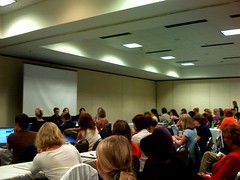 The Life Stages of Online Communities
The Life Stages of Online Communities
Session overview: "Communities have a lifecycle. What we do to nurture them depends on
where a community is in its life. Talk with people at all stages of
managing online communities as part of for-profit and non-profit
endeavors. What are best practices, pitfalls and warning signs to look
for at the birth, growth spurt or middle-age of your community?"
- Jane Goldman,
editor-in-chief for several cnet communities, moderates this discussion
with managers of communities at various life stages - Carol Lin.
Carol is the former CNN anchor who left the network to care for her
husband as he died from cancer. Carol is in the process of giving birth
a new online community and social network deigned to support cancer
families. - Betsy Aoki from
Microsoft has been community manager for multiple developer and
end-user communities…and has watched them go through their difficult
adolescent phase and come out, well-adjusted, on the other side. - Aliza Sherman, aka CyberGrrl, has seen the birth…and death…of more than her fair share of online communities.
A few key points that have been made regarding growing a healthy community:
- Find the "tipping point" connectors in your network, and let them know about the community. Even if they may not participate, they may know others who will.
- Have code of conduct, but have a sense of humor about it.
- Communities may have 1% "high volume" participants, 9% "occasional" participants. The remaining 90% often read, but do not overtly comment. (ed. – that said, this "90%" group of constituents may be active participants in other communities, or may eventually move into the other 9% or 1% groups — they are just as critical to community health as the other groups)
- Acknowledge first-time posters; it provides an example to the other 90% of of the community who read, but who have never posted.
- Enforce the "living room rule" as a comment policy
- Clearly state the mission of the community
- Creators of the community need to be able to plan and understand that, if the community is successful, that the original community organizers will need to "let go" of the community and allow it to run on its own
- "Serve first, then be called to lead" was suggested as a possible model
- There is no "rule of thumb" for the projected lifespan of an online community – can be months to years or, conversely, some may never make it to launch